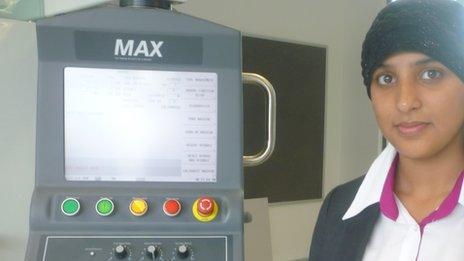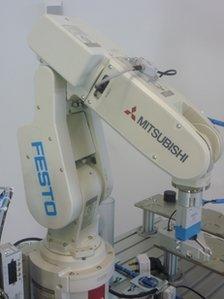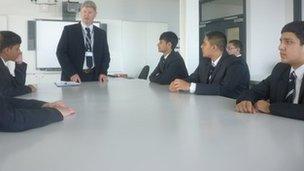Aston University's academy: The school where pupils wear suits
- Published

Aminah Bibi said she wanted to help produce engines in the future
"It's really posh and new and... all the machines and everything they've got, it's not like what you get in a normal school."
Aspiring engineer Aminah Bibi, 16, was impressed when England's first university technical college [UTC] with a university name welcomed its first 145 students earlier.
The young people wear "business dress" and learn from 08:30 until 17:30 at the new £16.5m Aston University Engineering Academy in Birmingham, which delivers apprenticeships.
Aminah has moved there after securing six A and six A-star grades at GCSE - and she already has career plans mapped out.
'Big step'
The Hall Green teenager said: "I want to work with the RAF, helping make the planes, the engines and stuff like that.
"My parents really didn't want me to come here at first, took some convincing, because when I heard about this place... I didn't really believe that there could be a place like this.

The site includes a robot which is part of a small model of a production line
"[But] I'm pleased to come here.... It's a big step for me."
The academy will allow students aged from 14 to 19 to specialise in engineering and science alongside core subjects in English, mathematics, languages and business.
It will offer young people the chance to work with leading engineering firms and businesses, including Jaguar Land Rover, Rolls Royce, National Grid, Eon and Goodrich, using a staff/student ratio of one to 10 for practical sessions.
A Year 10 boy from Handsworth Wood, Jaskaran Notta, 14, said: "My parents... were not sure whether to move me because I've just started my GCSEs this year, but in the end we just decided to move.
"I'm looking to go into electronic engineering... designing new technology like iPhones and stuff."
The academy currently has 12 apprentices, who will be paid £100 a week by RS Fleet Installations, a vehicle electronics firm in Perry Barr in the city which installs the likes of car stereos.
In one example of teaching at the academy, students will work with a robot which is part of a small model of a car production line.
Teachers will be trained on how to use it by staff from German company Festo, which provides equipment for Jaguar Land Rover and Ford.
'Future workforce'
Many of the academy's "industrial partners" are not providing financial sponsorship.
Principal Lee Kilgour said: "What they're getting out of it I suppose is corporate social responsibility.

The academy can cater for 600 young people in future years
"They see UTCs as their future workforce... It's in their interests to work with us.
"With Rolls Royce, [students] learn about how the component parts, the large parts of the Trent engine are manufactured and assembled.
"They use small steel models and aluminium models to build a miniature model of a jet engine."
The academy, at Birmingham Science Park Aston, is one of three UTCs opening this month after the JCB Academy in Staffordshire opened in 2010 and the Black Country UTC, sponsored by Siemens, followed in 2011.
The NASUWT teaching union has argued that technical colleges will increase the segregation between academic and vocational paths, because pupils will physically be in different schools.
In response, Mr Kilgour said: "It's quite a distinctive offer, but we do offer the core academic courses that students need to progress onto a range of A-levels, etc.
'Strong qualifications mix'
"So, students at 16 may decide at that point engineering is not a pathway for them and they'll still have a really good, strong mix of qualifications."
Students up to the age of 16 study seven GCSEs in English, mathematics and science and four engineering GCSEs or equivalent to GCSEs, including City & Guilds qualifications.
Those from the age of 16 can take a BTEC National Extended Diploma in Engineering, possibly with A-levels.
The Aston building was completed on time, after contractors started work in March 2011.
The academy now has 145 students in years 10 and 12 only, out of a capacity of 180. It can cater for a total of 600 young people in future, when other year groups are expected to join.
Government funding has been secured for this year. The university supplies aspects including the curriculum, HR and payroll services, sports facilities, marketing and governors.
All 27 staff, including 14 teachers, are in place. The academy hopes to have about 70 staff, including about 35 teachers, if it reaches its student capacity figure in future.
- Published5 September 2012
- Published23 August 2012
- Published29 May 2012
- Published7 October 2011
- Published18 February 2011